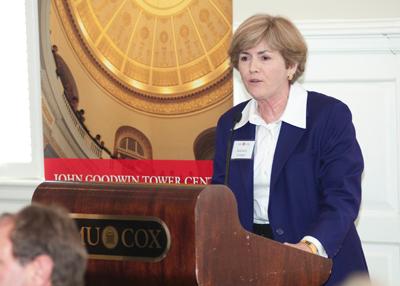
Kathleen Cooper speaks at a John G. Tower Center event in 2011. (Courtesy of SMU)
Kathleen Cooper has been a chief economist at ExxonMobil, a banker, the dean of UNT’s business school and the under secretary for economic affairs at the U.S. Department of Commerce.
Now, she calls SMU’s John G. Tower Center for Political Studies home. As a senior fellow and head of international political economy at the center, her unique insights and career experiences have landed her a role as an economic adviser with Mitt Romney’s presidential campaign.
A doctorate in economics, Cooper’s career path was not originally focused on politics.
“I was a business economist. When I first went to Washington to work for George W. Bush, it was a new experience for me,” Cooper said.
Cooper, after spending four years in the Bush administration, is no longer a stranger to politics.
Cooper’s role in the Romney campaign involves offering advice on critical issues for almost every voter – lower unemployment rates and economic growth.
Cooper stresses two issues – tax reform and regulatory clarity – in discussing how the U.S. economy can rebound.
“I think tax reform would be a very good idea. Simplifying the tax code and being especially careful about the types of regulations we put into place are important,” Cooper said.
She also warned against short-term regulation and its impact on business decisions.
“I am very concerned with all the ups and downs with regards to policy. Short term policies don’t do a good job of encouraging businesses to make long term investment decisions,” she said.
She singled out the Affordable Care Act – Barack Obama’s landmark health care reform legislation – as a piece of new regulation that is impacting business-hiring decisions.
“The addition of healthcare requirements on companies of a moderate size is a factor in reducing job growth,” she said.
According to Cooper, however, tax reform and regulatory changes are not the only parts of the equation.
She warned against painting reforms in terms of rich and poor and majority and minority – a recent trend in American politics.
“The best thing we can do is to not get into so much discussion of rich versus poor. There has been way too much of that,” Cooper said.
Cooper, the former chief economist of Exxon Mobil, one of the world’s largest oil companies, also stressed the potential for the energy sector to create new jobs.
“Projects like the Keystone Pipeline should be approved and put into place,” she said.
President Obama rejected the construction of the Keystone Pipeline, which planned to connect the oil sands of Alberta, Canada to multiple United States destinations in early 2012.
While Cooper sees the potential in renewable energy sources, she remains a realist when it comes to the current state of alternative energy technologies.
“We haven’t found a replacement yet that is cost effective. It’s fine for us to continue to look at solar and try wind but they really can’t take the place of fossil fuels yet,” she said.
“We should also pursue cleaner sources of energy like natural gas when given the chance.”
While Cooper has carved out an area of expertise in energy, her true passion remains international political economy.
Cooper, with a spark in her voice, admitted, “International political economy is my real interest.”
International political economy, a fusion of political and economic analysis, is a critical area of study for trade, finance and migration.
Cooper pointed to two critical issues that the United States must solve if it is too continue to experience growth and stability.
“We need to get the world back on track in accepting improvements in our world trading regime and ensuring that financial institutions, some 50 years old, meet today’s needs,” Cooper said.
She is not optimistic about quick changes in international trade and finance.
She believes that the weak American economy is partially to blame for slow changes in America’s trade outlook.
“Americans are very afraid of trade. They don’t see the positives,” Cooper said. “They see much more when jobs are lost from imports than when jobs are gained from exports.”
Cooper, a Dallas native, is grateful for her career opportunities.
Now, back in Dallas, she appreciates what life at SMU offers.
“I’ve been privileged to have a rich career in the business world and government,” Cooper said.
“And to now be involved with a good group of people and students, I’m very pleased.”








